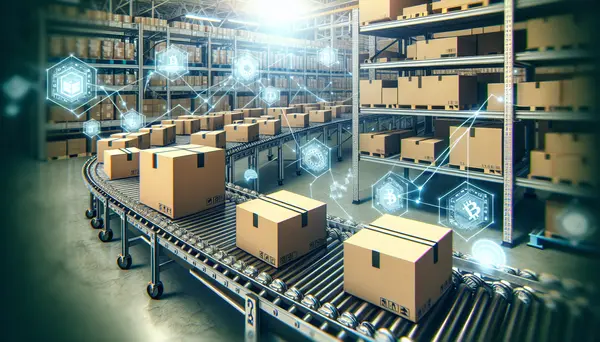Introduction to Blockchain and Supply Chains
Before diving into the transformative power of blockchain, let's briefly touch upon what this technology is. Blockchain is a type of database that stores information in blocks that are chained together. As new data comes in, it is entered into a fresh block. When the block is filled with data, it is chained onto the previously filled block, forming a chain of data known as blockchain.
So, how does blockchain intertwine with supply chains? Well, a supply chain is a network between a company and its suppliers to produce and distribute a specific product or service to the final buyer. It involves different activities, people, entities, information, and resources. The effectiveness and efficiency of a supply chain significantly influence business profitability. Yet, traditional supply chains are fraught with inefficiencies and a lack of transparency that blockchain technology is perfectly suited to address.
The Best Mining Providers at a Glance
» Infinity HashFrom our perspective, currently the best mining provider on the market. With the community concept, you participate in a mining pool completely managed by professionals. A portion of the earnings are used for expansion and maintenance. We've never seen this solved as cleanly anywhere else.
» Hashing24A well-known and established cloud hosting company. With a good entry point and in a good market phase, a good ROI can also be generated with some patience. Unfortunately, we see the durations as a major drawback.
In this article, we will explore the transformative role of blockchain in revolutionizing supply chains. By understanding how blockchain can streamline supply chains, enhance transparency, and boost efficiency, you will gain valuable insights into this innovative technology's practical applications.
Understanding Blockchain
While blockchains are primarily known for powering cryptocurrencies such as Bitcoin, they extend far beyond enabling digital currencies. A blockchain is a decentralized and distributed digital ledger that records transactions across many computers, making the involved data both transparent and immutable. This ensures that no single entity controls the data, fostering a newfound level of trust and security in digital information transfer.
Blockchain operates in peer-to-peer networks and employs cryptography to ensure that data is practically impossible to change or alter. It removes the need for intermediaries, empowering direct interaction between parties. All these unique features of blockchain technology present a game-changer for multiple sectors, including supply chains.
So, let's see how these properties of blockchain can turn the tide in supply chain management, making them more efficient, transparent, and secure.
Pros and Cons of Implementing Blockchain in Supply Chain Management
| Pros | Cons |
|---|---|
| Enhanced Transparency - All parties in the supply chain can view and verify transactions. | Cost of Implementation - Transitioning to a blockchain model can be expensive, particularly for small and medium businesses. |
| Reduced Fraud - As each transaction is recorded and verified, the likelihood of fraud is significantly decreased. | Regulatory Challenges - Regulations surrounding blockchain are still being formed, which may pose a legal risk. |
| Improved Efficiency - Blockchain reduces the need for intermediaries and manual tracking processes. | Technical Understanding - A deep technical understanding is needed to implement and maintain a blockchain supply chain. |
| Traceability - All goods in the supply chain can be tracked in real-time from production to delivery. | Scalability Issues - Scalability can be an issue with blockchain, particularly with a large number of transactions. |
Blockchain's Impact on Supply Chain Management

One of the most impactful ways that blockchain is revolutionizing supply chain management is by providing unprecedented transparency. Every transaction and transfer in the supply chain can be recorded on the blockchain, resulting in a permanent history of a product, from manufacture to sale.
This 'digital history' of a product is incredibly valuable for both businesses and consumers alike. Businesses can use this information to identify inefficiencies or bottlenecks in their supply chain, while consumers gain insight into the product's journey, including sourcing of materials, workers' conditions and environmental impact.
Blockchain also enhances the security of supply chains. The immutable nature of blockchain transactions means they cannot be tampered with, reducing the likelihood of fraud, counterfeiting and theft. Additionally, it can improve the traceability of products, enabling quicker response times in case of defects or recalls which protects both businesses and their customers.
Lastly, the efficiency of supply chain operations is significantly boosted with the elimination of intermediaries. Blockchain enables direct interaction between parties, accelerating transactions and reducing costs. The result is a leaner, more efficient and more cost-effective supply chain, saving businesses money and enabling them to pass those savings on to consumers.
How Blockchain Revolutionizes Supply Chains
The introduction of blockchain into the realm of supply chains is akin to a wave of transformation sweeping across the industry. This transformation has a profound impact on the efficacy, integrity, and overall operation of supply chains. Let's explore the key ways in which blockchain is making this happen.
At its core, the issue of trust in supply chains poses a significant challenge. With numerous parties involved, ensuring every transaction is authentic and every product is legitimate can be daunting. Blockchain wields its decentralization and transparency to combat this issue. As all transactional data is recorded and visible to all parties involved, trust is inherent in the system. This minimizes the risk of fraudulent activities and enhances the overall integrity of the supply chain.
Closely tied to trust is the aspect of traceability. Understanding the journey of a product right from its raw material stage to when it reaches the consumer can be incredibly complex. Blockchain simplifies this by providing a real-time, unalterable record of the product's journey. This level of traceability can greatly benefit various sectors, particularly in food safety, pharmaceuticals, and luxury goods, where authenticity weighs heavily.
The integration of blockchain into supply chain operations also results in enhanced efficiency. Thanks to the elimination of intermediaries and third parties, transactions are faster and more direct. The data sharing process is streamlined, reducing administrative time and costs. Ultimately, blockchain can drive supply chains toward a more efficient and cost-effective future.
Lastly, the potential for smart contracts within the blockchain has significant implications for supply chains. These are self-executing contracts where the terms of the agreement are written into code within the blockchain. They automatically implement actions like payments or the transfer of goods when predefined conditions are met, thereby reducing human intervention and errors, and improving overall efficiency.
Practical Examples of Blockchain in Supply Chains

Many prominent companies have recognized the benefits of integrating blockchain into their supply chains. For reader context, let's spotlight a few practical examples.
De Beers, the diamond giant, utilized blockchain to track the journey of diamonds from the mine to the customer to root out issues like conflict diamonds and counterfeit products. Through their initiative, they have been able to assure their customers that their diamonds are ethically sourced and genuine.
The food industry is another area where blockchain has been making waves. Walmart launched a blockchain-based project to monitor its pork supply chains in China. Through the use of blockchain, Walmart managed to reduce the time it took to trace the origin of a food item from a staggering 7 days to a mere 2.2 seconds- a game-changer in the event of a food recall or contamination scare.
A noteworthy case in the shipping industry is how Maersk, a global logistics company, partnered with IBM to implement a blockchain-based shipping solution. This effort resulted in improved transparency and efficiency, reducing administrative costs and lowering the risk of goods being misplaced during transit.
While these are just a few examples, they underline the transformative power of blockchain in supply chains across diverse industries.
The Future of Blockchain and Supply Chains
Looking ahead, the symbiotic relationship between blockchain and supply chains is set to deepen, with broad implications for industries worldwide. As novelties wear off and the technology matures, the blockchain's full potential in the supply chain domain will become more evident.
Expect to see blockchain-driven innovations take root in areas such as automated deliveries, demand prediction, IoT integration, and sustainable sourcing. Each of these applications can address persistent supply chain challenges like inefficiencies, fraud, and demand-supply imbalances, shaping the future of industry operations.
Increased blockchain adoption will also put the focus on regulatory issues, as governments and international agencies will need to catch up with the pace of technology. Regulatory advancements coupled with technology improvements could lead to widespread acceptance and utilization of blockchain in supply chain systems.
On the journey to this future, pilot projects and early adopters will continue to play a crucial role. By testing out blockchain-based solutions in real-world supply chains, they will drive technology refinements and enterprise confidence, paving the way for mass adoption.
Indeed, blockchain is not just a passing technological fad. It has the potential to revolutionize supply chains, bringing about an era of transparency, security, and efficiency previously unattained. So whether you're a business leader, supply chain professional, or simply someone interested in the progress of technology, blockchain's emergence in the supply chain landscape is a trend to not just watch but engage with actively.
Conclusion and Key Takeaways

The power of blockchain is not just limited to cryptocurrency. Its potential for revolutionizing supply chains is undeniable. This technology brings to the table transparency, security, and efficiency that traditional supply chains have categorically lacked. Whether it's maintaining trust through a decentralized system, ensuring authenticity via a secure and immutable ledger, improving traceability, or reducing the need for intermediaries, blockchain holds a multitude of benefits for supply chains.
Adapting blockchain technology in supply chains can redefine how we perceive and consume our products, moving us towards more ethical, efficient, and transparent practices. Companies utilizing blockchain are likely to see a transformation in their operations, witnessing significant cost-efficiencies and streamlined processes. Consumers, on the other hand, stand to benefit from increased trust and confidence in the products they purchase knowing the source and journey of these goods.
In conclusion, the implementation and optimization of blockchain technology can lead to a new era of innovation in the field of supply chain management. It promises to be a potent tool for combating inefficiencies, fostering transparency, and driving meaningful advancements in this crucial sector. As understanding and adoption expand, blockchain will continue to reshape our world in ways we can only begin to imagine.
Understanding Blockchains Impact on Supply Chain Innovation
What is Blockchain's role in supply chains?
Blockchain technology can provide greater transparency, improve efficiency, and enhance the security of the supply chain by creating a decentralized ledger that is accessible to all participants in the supply chain network.
How Can blockchain improve supply chain management?
Blockchain can improve supply chain management by helping to reduce fraud and error, improve inventory management, minimize courier costs, identify issues faster, and increase consumer and partner trust.
What are the real-world examples of blockchain in supply chains?
Companies like De Beers uses blockchain to track diamonds from the mine to the customer purchase. It reduces the impact of conflict diamonds. Similarly, Walmart uses a blockchain-based system to track the origin of fruits and veggies in its stores.
What are the challenges in implementing blockchain in supply chains?
Some challenges include technical understanding and expertise relative to the blockchain, the need for widespread adoption, issues regarding scalability and performance, and regulatory considerations.
How secure is a blockchain-based supply chain?
Blockchain's decentralized nature makes it inherently more secure than traditional centralized databases. Even if a single node in the network is compromised, the entire system remains secure due to the distributed ledger technology.








